TIFF '23: The Best International Film Oscar Race
 Wednesday, September 20, 2023 at 11:30PM
Wednesday, September 20, 2023 at 11:30PM 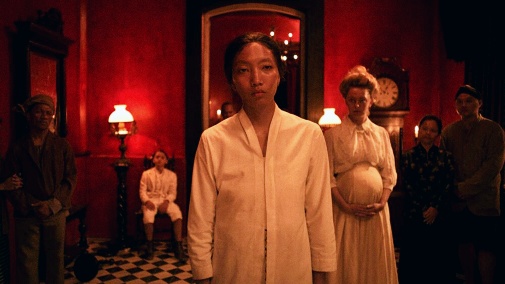
The Toronto International Film Festival represents an excellent opportunity to get in touch with cinema from all over the world. For Oscar obsessives, it provides a great chance to catch up with Best International Film submissions, especially as they're announced throughout the festival. I already covered some of them – Australia's Shayda, Bhutan's The Monk and the Gun, Brazil's Pictures of Ghosts, Chile's The Settlers, Finland's Fallen Leaves, Germany's The Teachers' Lounge, Romania's Do Not Expect Too Much from the End of the World, South Korea's Concrete Utopia, and Turkey's About Dry Grasses. However, there are still some more TIFF titles to review.
They are the Netherlands's Sweet Dreams, Tunisia's Four Daughters, and Morocco's The Mother of All Lies. Though they haven't been officially selected, I also saw two of Norway's three finalists, A Happy Day and Songs of Earth…
SWEET DREAMS, Ena Sendijarević
Set in the Dutch East Indies circa 1900 and divided into six chapters, Sweet Dreams starts with the thrill of the hunt. The target is a majestic tiger, predator turned prey at the hands of a little boy with a shotgun. He's Karel, the illegitimate son of a sugar baron, one of those European plantation owners who came to exploit the land of its resources and hard work out of the natives. Soon, the old man dies, prompting the return of a much-hated prodigal son and his pregnant wife, keen on selling the place for parts and leaving the matriarch, Agathe, to destitution. But a problem arises, for the pater familias' last will and testament stipulates he left everything to the bastard child.
Prodding the iniquities of this tale, director Ena Sendijarević takes to her nation's colonial history like a satirist with a taste for the grotesque. That's immediately apparent in our first glimpse of Agathe, slumbering sweaty with eyes painted over her closed lids, ever-watchful like some white witch. Later, as a party unravels inside the plantation house, the intersection of cinematography, set, and costume design proposes a vision of the world rendered in rusty reds and gangrenous greens. The space suggests a rotting organ, the people a lace-like mildew growing over dead tissue. Even the glow of the candles sickens the eye, only serving to make perspiration shine and paint skin sallow.
When the heir apparent arrives, the couple makes an even odder picture. Their temperament is so unsuited for the hot climate you can practically feel their discomfort and smell the body odor emanating from the screen. Such ghastly appearance serves to externalize interior putridness, since their words against old-fashioned domination are a mere smokescreen to hide their disdain. These Europeans think rules don't apply in the colonies and act like it. And so, Sendijarević will film them like manifestations of hell on Earth, as pathetic as they are insidious. Watching them on screen, you might feel like you need a shower after the credits roll.
Still, for all that she attacks our senses and conscience, the director of Sweet Dreams remains at a level of detachment that can be alienating. The young auteur formulates a visceral experience while keeping her viewer at a distance, through framing, an electronic score, stylized performance. But perhaps alienation would be an inevitable reaction to the people that populate the film, disgusting creatures stripped of dignity with one exception. She's Siti, Karel's mother and the plantation house's servant, a strike of fortitude within this nightmare who, by the end, is buzzing with such anger you can imagine her setting the whole world on fire. Maybe, through flame, we'll all find salvation or, at the very least, a punishment fit for humanity's collective crimes. In that expiation, there could be peace. Then again, maybe not.
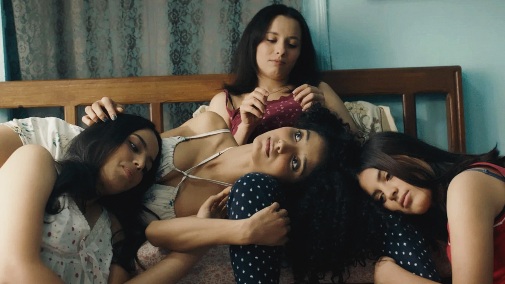
FOUR DAUGHTERS, Kaouther Ben Hania
After finding much success in narrative cinema, Tunisian filmmaker Kaouther Ben Hania returns to the documentary form in her latest work. Well, that's part of the truth. You see, the director has devised a meta-cinema exercise through which a chimeric form of non-fiction is birthed into the world, complete with re-enactments where a cast of actors join people playing themselves. They are a family of women, Olfa and her two youngest daughters. The eldest pair suggested by the title is nowhere to be seen, appearing on-screen by proxy of those anonymized actors. Their absence is a mystery the film will gradually explore. After all, why aren't they here? What happened?
Before such revelations, however, Four Daughters tests how far the audience, the camera, and maybe even the director want to relate to the figures on-screen. Olfa is at the heart of the complications, providing the picture with its thorniest element as well as its raison d’être. She takes center stage, the only present person who's sometimes replaced by an actress, often when the feelings are too raw to relive, the events too traumatic to contemplate. And yet, she herself is a source of trauma for others, empathy withering on the vine of her mother's love. At one point, we'll see her coddle a pregnant cat, musing on how the feline is sometimes so scared for her babies she'll devour them. It's not hard to imagine Olfa doing the same.
That's not to say Ben Hania has devised an exploitation of the bereaved mother. Instead, the director follows various avenues of thought, using her hybrid approach as a weapon to cut through a forest of distractions, in pursuit of truth. There's not just one possible reading of Olfa but a multitude in reflection of the film's many facets. It doesn't all work seamlessly, and sometimes, the docudrama mechanism is a distraction in itself. However, there's an emotional wallop waiting at the end, as Four Daughters contends with a tragedy without resolution. Catharsis denied, we're left with a gesture of defiance against those searching for easy answers. There are none here, and that's how things should be.
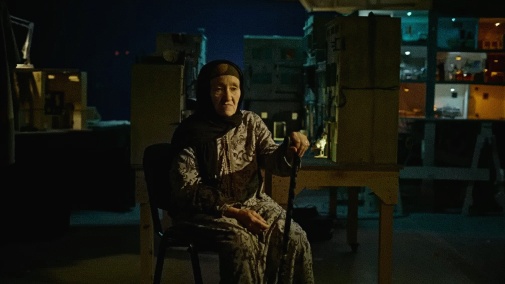
THE MOTHER OF ALL LIES, Asmae El Moudir
Back at Cannes, Four Daughters won the Golden Eye for Best Documentary ex-aqueo, sharing the prize with the Moroccan Mother of All Lies. That's not the only factor joining the two pictures, as both represent a dismantling of documentary dictums, reaching for dramatization as a tool, a facilitator, a prism through which to consider yesterday's horrors. They're also about families playing themselves in the aftermath of tragedy. Though, while Kaouther Ben Hania looked beyond her blood and used actors, Asmae El Moudir considers her family unit, allowing them to build the diorama-like miniaturization of their suffering.
It revolves around the Bread Riots of 1981 when a citizen strike resulted in a massive government take-down, a massacre. Relocated to a studio, the director's family and old neighbors recreate the Casablanca street where they lived at that time, resurrecting ghosts through clay figurines and exorcising the demons lurking within. At one point, a man recalling his experience behind bars seems to vomit his memories, theater made therapy. Or that's the artist's intention. The eventual result is more complicated, a collection of fractured lines far from some shining notion of healing through the miracle of cinema. Nothing could ever be so simple.
That's not to say the centrality of image-making as a conduit for self-discovery and truth-finding isn't there. It's merely seen through clear eyes, idealization left aside to allow the real mess to shine through. And what is outrage, if not messy? In a present where the executioners are granted important positions while the martyrs lie buried in mass graves, one should shout their anger to the heavens. Indeed, the screen vibrates with that scream, a fury that promises the dead will never be forgotten. No matter that they have to be invoked through these handcrafted means, collages and miniatures. The Mother of All Lies is as much about the past as it is about its own making, its imperfections and limitations - how, despite it all, the film's purpose remains set, resolute.
Furthermore, the documentary must contend with a damaging matriarch of its own, a domestic tyrant whose domineering presence is so vividly captured by the camera that one might grow uncomfortable with the picture's ethics. She's Zahra, the director's grandmother, who forbids photos in her house and rules over her descendants with an iron fist. Embodying a policy of silence, the woman appears to us like a grumpy sculpture of old pains, passing them down to the next generation while calling it tough love. "My grandmother is a dictator who oppresses everyone," says El Moudir, but even then, nothing could be so simple as that, and the film knows it well.
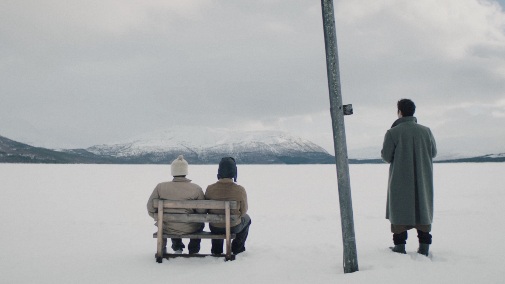
A HAPPY DAY, Hisham Zaman
Dedicated "to all the youth with hopes and dreams who were sent out of the country to an uncertain fate the day they turned 18," A Happy Day puts forward an indictment of Norway's handling of the refugee crisis. It does this by centering the plight of unmoored adolescents stuck in a remote center, halfway between an orphanage and a prison. They're granted temporary asylum while still minors, but on the day they become adults, it's off to deportation, back to the country they left to save their lives. Rather than a cake, the orderlies might as well gift them a shroud. The situation's so dire they often attempt escapes.
Sadly, those tend to end with the kids stranded in the cold tundra, freezing in front of great mountains that stare down at them like angry gods. Descriptions like these may suggest a depressive watch, all monotone misery – that would be erroneous. With shades of Tati and Ben Sharrock's Limbo, A Happy Day points its finger at the unjust system while smiling a sardonic grin. Better to laugh than to cry, so we contend with pitch-black comedy born out of despair and the awkwardness of teenagers. There's also a poet, new attractions, and the froth of jumping hormones, finding love in a hopeless place and losing it again.
Deadpan from minute one, the ironically titled A Happy Day grows in sorrow until its end, by which point, it's hard to keep the tears at bay. The undercurrent of melancholia overflows and the audience's defenses go with it. Even with a needless bit of CGI, an unadvisable repetition, unconvincing romance, and the lot, this film can inspire awe. It's a gut punch, alright.
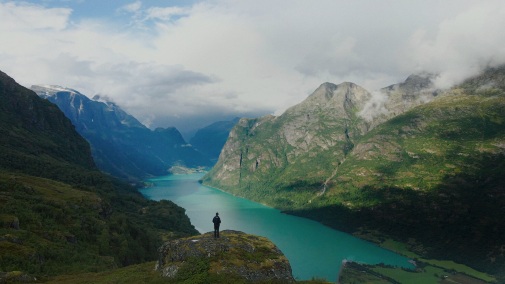
SONGS OF EARTH, Margreth Olin
With executive production by such big names as Liv Ullmann and Wim Wenders, Songs of Earth should feel like a grand opus bound to pulverize the viewer with its importance. Instead, it keeps things small and personal, rich in monologue and testimony, family history and loss – a genius choice, all things considered. Through this approach, director Margreth Olin balances human insignificance with Mother Nature's vastness, combining the sweeping vistas of Norway with a daughter's loving homage to her parents, her bedrock foundation. Most of all, it's a lyrical twist on landscape cinema where inward rumination is an anchor, grounding the project in heartfelt terms.
Looking deep into the landscape, Olin sees a repository of memories, and through her camera, we're gifted the same perspective. We are dust and to dust we will return, leaving behind a land that's as much ice and stone as it is ghosts. That's not to say the director lets the smallness of humans overcome the sensorial wonder of the wild outdoors, its monumentality. In fact, Songs of Earth is a magnificent spectacle ready to take your breath away, full of indelible images and unforgettable sounds. You've heard of city symphonies, so get ready for a fjord requiem, a surge of audiovisual poetry like none other.
Come see how bubbles get stuck in frozen lakes, diamante beads under the surface. Listen to the paradoxical soothing of an avalanche's rumble. Remember that humanity's first love was the nature around us – never forget.
Norway will announce its final decision on September 22nd. It's between these two works and Let the River Flow. You can read more about it here.



Reader Comments (3)
Spain also announced their candidate yesterday: 'Society of the snow', a survivalist thriller by JA Bayona (The Orphanage, The Impossible, A monster calls). Sight unseen, it doesn't sound like a very AMPAS-friendly choice. But then, the Spanish Academy are terrible at making logical choices on what to send to the Oscars. The other finalist were the trans family drama '20,000 species of bees' (which was a success at the latest Berlin fest) and 'Close your eyes' which is Victor Erice's first film in decades.
Carlos -- Having watched CLOSE YOUR EYES and 20,000 SPECIES OF BEES, I found that both had great chances at getting into the shortlist. Now, I don't know about Spain's chances, especially as I imagine Netflix will have other priorities come awards season. Still, as I read more about SOCIETY OF THE SNOW, it does seem like an Oscar-friendly project - AMPAS loves inspirational true stories. It just feels much less interesting as cinema than the other two candidate, which makes me sad.
I have tickets to see A Happy Day, Concrete Utopia, Fallen Leaves, and The Teacher's Lounge at a film festival in a couple weeks... I am excited.
I also have tickets to see The Taste of Things. I'd love to read your or Nathaniel's analysis of France's decision and whether you think it will impact Anatomy of a Fall's larger Oscar chances. Best Actress in particular is shaping up to be so competitive this year, especially now that we know that Lily Gladstone will be in that race.